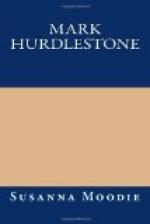I have it not to send; my sin has found me out.
A thief and swindler! Can it be possible
that I have incurred such dreadful guilt?
“Night.—I have seen Godfrey—he has failed me. What shall I do? I must go to my father; perhaps he will relent, and pity my distress. My heart is torn with distracting doubts. Oh, that I could pour into some faithful bosom my torturing situation! Clary is ill—and left to myself, I am lost.
“Midnight.—I have seen my father. What a meeting. My brain aches while I try to recall it. At first he insulted my agony; taunted me with my misfortunes, and finally maddened me. I cannot describe to you what passed. Wound up to a pitch of fury, I threatened to obtain the money by violence, if he did not write an order upon his banker for the sum required. Cowering with fear, he complied; and I—I, in the fullness of my heart, implored his pardon for the language I had used, and blessed him. Yes, I blessed him, who only a few minutes before had spurned me from his feet—had mocked at my calamity—and cursed me in the savage malevolence of his heart. Some feeling of remorse appeared to touch his cruel breast; as I left the house he called after me, ’Anthony, Anthony, to-morrow night I will do you justice.’ I will go to him no more. I feel that we have parted for ever.
“Thursday evening.—The old man has deceived me—has jested with my distress. I could curse him, but I have not done so. To-night we shall have a fearful reckoning; yes, to-night he will be forced to do me justice.
“Godfrey has been with me. He discovered the cruel trick which the unnatural wretch who calls himself my father had played me—and he laughed. How could he laugh at such a melancholy instance of depravity? Godfrey should have been this man’s son. In some things they resemble each other. Yes, he laughed at the trick. Is the idea of goodness existing in the human heart a mere dream? Are men all devils, or have some more tact to conceal their origin than others? I begin to suspect myself and all mankind. I will go once more to that hard-hearted man; if he refuses to grant my request, I will die at his feet. Last night I attempted suicide, but my good angel prevailed. To-night is my hour, and the power of darkness. Will he feel no touch of remorse when he beholds his neglected son—lost—bleeding—dying at his feet?
“Oh, that you were near to save me from myself! An unseen power seems hurrying, drawing me to perdition. The voice of a friend would dissolve the spell, and set the prisoner of passion free. The clock strikes eight—I must go. Farewell, my friend, my brother; forgive and pity the unfortunate
“Anthony M. Hurdlestone.”
He went—and the old man was found murdered. What more natural than such a consequence after penning such a letter? The spectators looked from one to the other: on every brow rested a cloud; every head was nodded in token of agreement; every one present, but Frederic Wildegrave, believed him guilty. He had retained no counsel, preferring to plead in his own defence.




